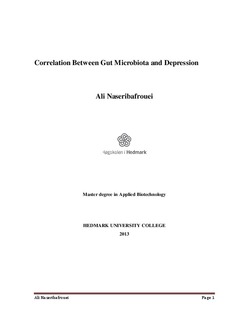Correlation Between Gut Microbiota and Depression
Master thesis
Permanent lenke
http://hdl.handle.net/11250/132357Utgivelsesdato
2013Metadata
Vis full innførselSammendrag
Gut microbiota consist of a variety of microorganisms which inhabit the human gut. They play many well-known roles in human gut homeostasis and may be implicated in some pathologic processes especially immunological events. Depression is a chronic syndrome with a pathogenesis linked to various genetic, biological and environmental factors. In recent years inflammatory factors has been mentioned as contributing factors for development and exacerbation of depression. Most of these inflammatory events are associated with disturbances in cortisol secretion and HPA axis. The role of gut microbiota in inflammatory events and co-morbidity of depression and hypercortisolism and other related inflammatory events has long been demonstrated. The aim of this study is to find out if there is a relationship between gut microbiota and depression. In this regard we took fecal samples from 56 people, 37 clinically-depressed patients and 19 control people who were drawn from both outpatient and inpatients at the Sykehuset Inlandet HF hospital, Hamar, Norway. Analysis of gut microbiota was performed by extraction of whole DNA from fecal samples. 16S rRNA gene was then amplified and applied as microbial molecular marker. Direct sequencing on pool of amplified 16SrRNA gene fragment; resolution of the mixed spectra using MCR-ALS multivariate statistics and taxonomic identification of dominant bacterial components using RDP database were then carried out to characterize the present bacteria. Along this, Illumina deep sequencing was performed on the 16SrRNA gene fragments and classification was performed based on the 100 most dominant OTUs. Salivary cortisol measurement (measured in the morning, mid-day and evening) was applied as biological marker for evaluation of baseline unstressed HPA function. Firmicutes and Bacteroidetes were the most dominant phyla in the gut. OTUs belonging to Bacteroidetes phylum collectively were significantly lower among depressed patients in comparison to control people. There were some significant correlations between both bacterial components and operation taxonomic units (OTUs) to depression and cortisol levels, highlighting the involvement of gut microbiota in immunological states and depressive symptoms, yet these correlations are not necessarily cause and effect relationships.
Beskrivelse
Mastergradsoppgave i næringsrettet bioteknologi, Avdeling for lærerutdanning og naturvitenskap, Høgskolen i Hedmark, 2013. Master of applied and commercial biotechnology.
